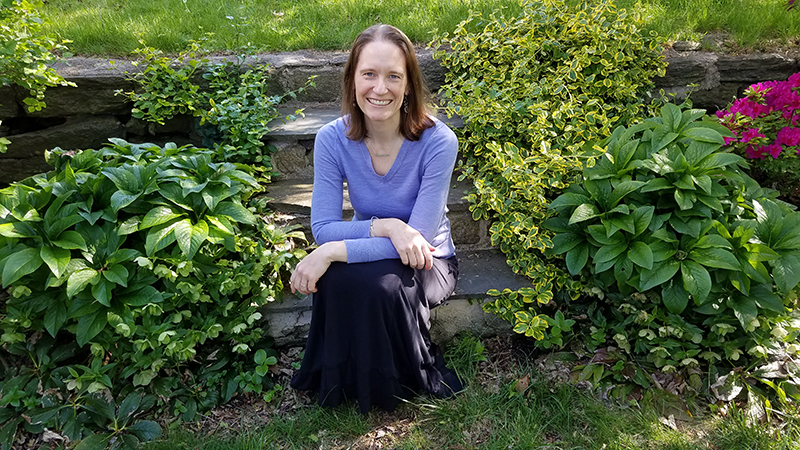Antarctica. Madagascar. Panama. Alaska. Comoros. Belize.
This isn’t a travelogue. They are just some of the places that Dr. Amy Freestone’s research has taken her in her continued study of how species interact with each other and their environment.
“My research explores how local-scale ecological processes, such as species interactions, vary predictably across global gradients, particularly latitude. From the poles to the tropics, biodiversity, environmental conditions, and evolutionary history change substantially, and these changes can influence the way our natural communities operate,” said Dr. Freestone, an Associate Professor in Temple University’s Department of Biology in the College of Science and Technology where she leads research on the ecology and conservation of species diversity. “In our research, we run large-scale field studies to explore these questions. Do species interact the same way in the subarctic and the tropics? Our research says no. These findings improve our ability to predict how ecosystems function across global scales, impacting everything from ecological stability to how susceptible ecosystems are to biological invasions.”
Dr. Freestone’s research and the work of the Freestone Lab bridges community ecology with macroecology, focusing on understanding feedbacks among processes that operate at the community scale and across regional to continental scales. She, several Temple PhD candidates and undergraduate researchers explore these processes and how they shape patterns of biodiversity. Their field studies and collaborative projects span pole-to-pole in the Americas, and to other continents as well.
Dr. Freestone knows a little something about field research, having called Antarctica and Madagascar home while conducting hands-on research. That experience made her the perfect candidate to take on the role of Director of the new Temple University Ambler Field Station, which will be a hub for a broad diversity of research conducted by Temple faculty and students and other university and community partners.
“I feel very grateful for the wonderful field experiences that I’ve had, and I am passionate about facilitating those experience for others. Being in the field is invaluable for certain research,” said Dr. Freestone, who spent time with Adélie penguins and seals during her time in Antarctica and Livingstone Flying Foxes in Madagascar. “The scale of my research has taken me to a lot of different places all over the world to study a variety of systems. I know firsthand that field stations come in all shapes, sizes and qualities, from completely rustic to state-of-the-art. The resources and facilities that field stations offer can affect the types of questions you’re able to ask and the research you are able to conduct.”
Dr. Freestone, who has been part of the Temple faculty for 10 years, completed her PhD in Ecology at the University of California, Davis, exploring local and regional drivers of terrestrial plant species diversity. Prior to arriving at Temple, she was a postdoctoral fellow at the Smithsonian Institution, where she expanded the geographic scope of her research to a continental scale, and shifted her primary study system to the nearshore marine environment. She maintains active research in both marine and terrestrial ecosystems at Temple and is additionally a Research Associate at the Smithsonian Environmental Research Center in Maryland and the Smithsonian Tropical Research Institute in Panama. Her research has been funded by the National Science Foundation and the Smithsonian Institution.
“My research directions are driven strongly by an intellectual curiosity in the biodiversity of nature and a personal commitment to informing conservation science. Temple is an excellent platform for my research and educational initiatives,” said Dr. Freestone, who also teaches Principles of Ecology, Plant Community Ecology and Ecology of Invasive Species, a course that could certainly make good use of the resources of the Field Station at the Ambler Campus.
As Faculty Director of the Temple Ambler Field Station, Dr. Freestone will work in close collaboration with Kathy Salisbury, Director of the Ambler Arboretum, and with the Tyler School of Art and Architecture’s Landscape Architecture and Horticulture programs, including the Greenhouse Education and Research Complex.
Dr. Freestone is responsible for leading the efforts to realize the vision for the Field Station as a resource for teaching and learning and for research and scholarship across disciplines. In addition to developing strong academic relationships with Temple’s colleges, schools and centers, she will promote the Field Station to partner colleges and universities and other institutions and organizations for teaching, research and scholarly activities. Dr. Freestone will additionally coordinate with Temple Ambler EarthFest Presents and the Ambler Arboretum on education and outreach programs.
Guiding the course of the Temple Ambler Field Station, “is an exciting new challenge,” she said.
“After being at the University for 10 years, I wanted to give back to the Temple Community in a meaningful way. I want to make the Field Station a valuable resource for our researchers and students,” she said. “I have a longstanding appreciation for field stations; I understand their inherent value and how much field experiences have meant to me. This new field station will provide excellent opportunities to broaden our research activities and make a large-scale educational impact.”
Dr. Freestone recently shared the news about the Temple Ambler Field Station with the international research community in the November newsletter of the international Organization of Biological Field Stations (OBFS). OBFS supports environmental research, education and public understanding.

